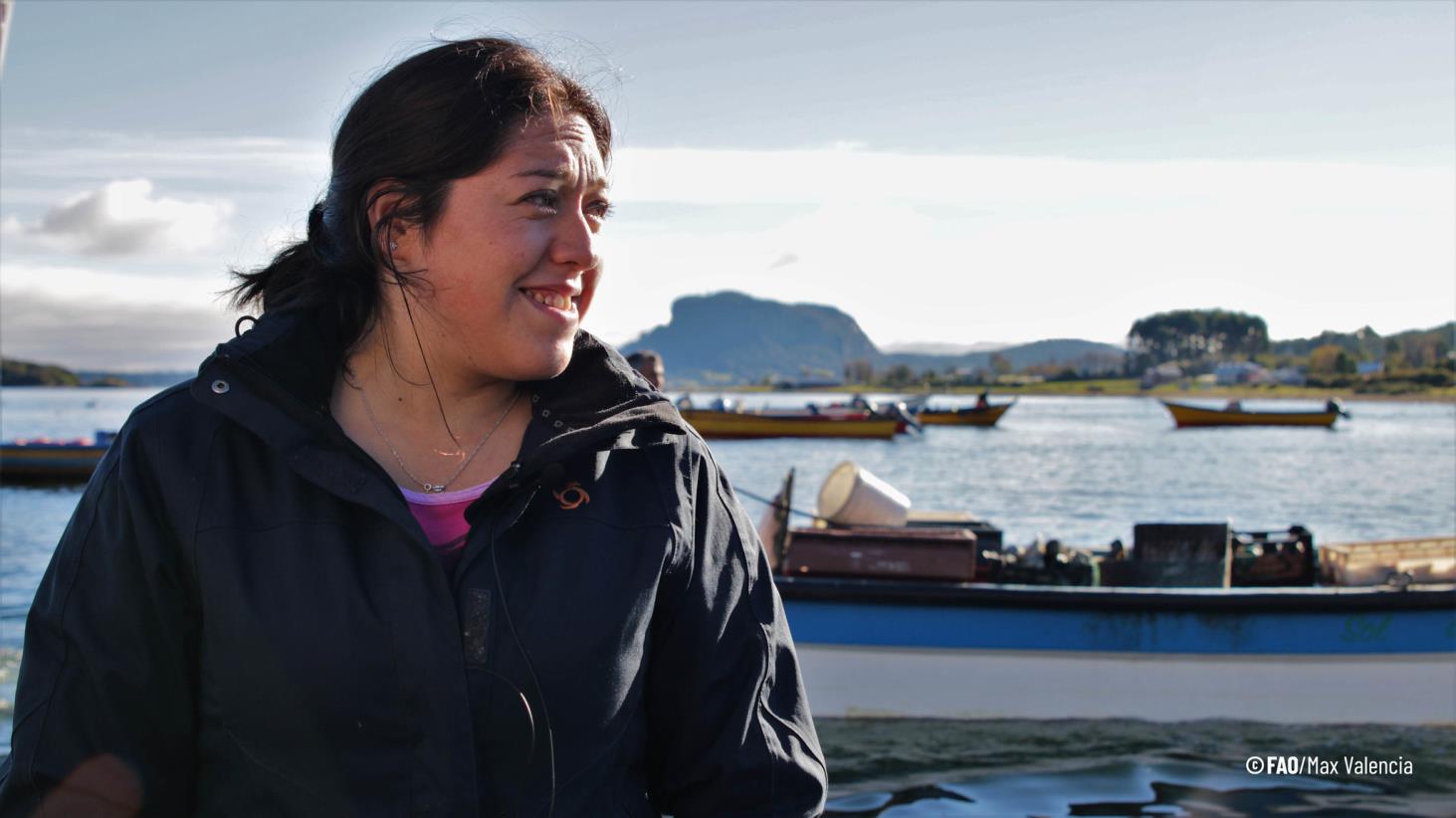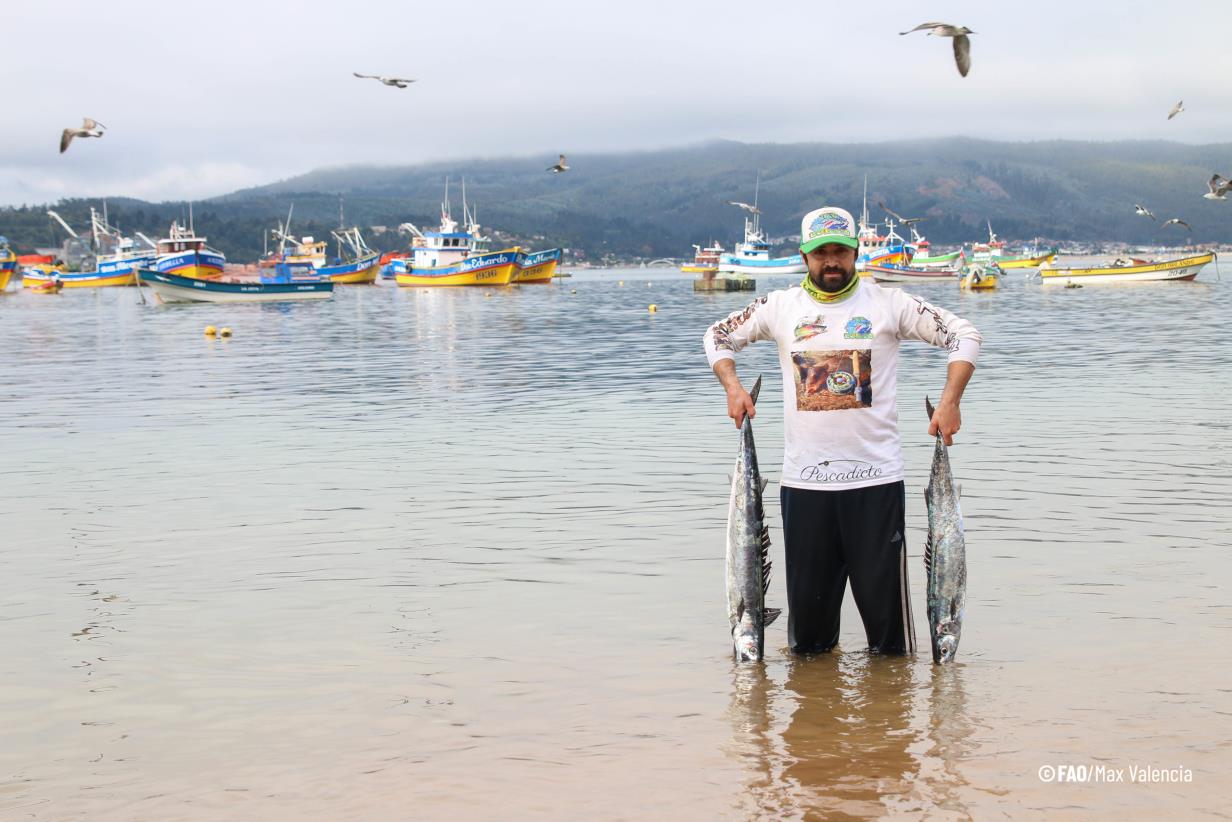
Living climate change on the coastline of Chile
Chilean artisanal fishers and small-scale fish farmers are having to adapt their livelihoods
Dramatic environmental changes are affecting the availability and abundance of species, forcing artisanal fishers and small-scale fish farmers along Chile’s vast coastline to modify their livelihoods. ©FAO/Max Valencia
05/11/2021
In the coastal community of El Manzano in southern Chile, artisanal fishers are on the frontline of the climate crisis. Of the 400 people who live in this picturesque town, most rely on small-scale fishing or collecting shellfish and seaweed to make a living.
But dramatic environmental changes are forcing artisanal fishers and small-scale fish farmers along the country’s 6 400-kilometre coastline to modify or supplement their activities, as the availability and abundance of species are affected.
“We are seeing changes that we have never seen before - excessive rain, inexplicable things,” says Alejandro Naiman, a hake fisher and community leader in El Manzano.
Fishing is one of Chile’s major agricultural sectors. The country’s total catch from fisheries and aquaculture reached around 3.4 million tonnes in 2019 and more than 200 000 people depend directly or indirectly on the sector for their jobs.
Alejandro says he and other artisanal fishers were forced to try their hand at mussel fishing when they saw a fall in the numbers of hake, one of Chile’s most popular fish.
It’s perhaps not surprising as the United Nations Intergovernmental Panel on Climate Change says the country’s coastal areas are experiencing increases in temperature, decreased rainfall, rising sea levels, acidification of seas and more frequent and extreme weather events.
“These changes threaten the future of fisheries and aquaculture in Chile because they affect the growth and reproduction of aquatic organisms and ultimately the abundance and distribution of marine resources,” says José Aguilar-Manjarrez, FAO Aquaculture Officer in Chile.


Artisanal fishers turned to mussel fishing as one alternative when they saw a fall in the numbers of one of Chile’s most popular fish, the hake. ©FAO/Max Valencia
Since Chile ratified the Paris Agreement in 2017, the Government has been looking to reduce emissions and improve the country’s ability to adapt to climate change.
Working together, FAO and Chile developed a specific initiative to help the country streamline its government processes in the sector, while also providing training for artisanal fishers and communities to improve their capacity and diversify their activities in response to climate change.
With funding from the Global Environment Facility (GEF), FAO and Chile’s Undersecretariat of Fisheries and Aquaculture and the Ministry of the Environment, conducted a project from 2017 to 2021 entitled, ‘Strengthening the Adaptive Capacity to Climate Change in the Fisheries and Aquaculture Sector’, to help reduce the vulnerability of four coves and their communities.
“We wanted to better prepare artisanal fishers and small-scale fish farmers so they have other job opportunities in case they find themselves in difficulty due to climate change,” says Aguilar-Manjarrez who oversaw the project for FAO.
More than 140 participants – men and women represented equally - from the coves of Riquelme, Tongoy, Coliumo and El Manzano-Hualaihué took part in the pilot project, which included training for coastal communities and school workshops. More than 400 public officials, national experts and community decision-makers also participated in the programme.
Alessandro Lovatelli, the FAO Aquaculture Officer who initiated the climate change project, says it demonstrated the need for flexibility from the government and the fishers. When tuna appeared in southern regions such as Los Lagos, for example, fishers affected by dwindling catch numbers were not permitted to catch the tuna because they were not an authorized species in their region.
“If you want them to survive, you have to be a bit more flexible,” says Lovatelli. “We trained artisanal fishers on alternative income sources, like small-scale aquaculture, and sought to promote seafood consumption. There's huge potential to farm with the right species if you provide the technology and you teach people how to do it.”

The Global Environment Facility, FAO and the government of Chile helped coastal communities reduce their vulnerability to changes in climate by diversifying livelihoods and imparting new ways of adding value to products. ©FAO/Max Valencia
With FAO’s input, both artisanal fishers and small-scale fish farmers learned new ways to add value to their products and diversify their production.
Luis Valdés, a shellfish diver in Riquelme on Chile’s far north coast, says he gained new skills from the FAO project. Using environmental data collected via portable devices, he is now better equipped to measure the salinity and oxygen levels in the water and guage productivity.
“Catching octopus and fishing are closely linked to changes in oxygen and temperature. For example, at 14 degrees the fish migrate, but at 18 degrees we have an ideal temperature for our work,” he says. “We also experimented with algae to see if it could be produced in this location.”
“People talk about climate change; we are living it every day,” says Juan Torrejón, head of the local aquaculture association in Tongoy. “Thanks to FAO’s support, we have a proposal for a processing plant, so our associates and cooperative are not just individual producers, but we can also offer products.”
Fishers also gained knowledge about how to value and promote their region’s natural assets and cultural heritage to supplement their marine resources through tourism.
Matías Torres, a fisher from Coliumo, gained new ideas for developing sustainable tourism. “Coliumo offers more than fishing. There is diving, nature trails, trekking and gastronomic products with a local identity. All these activities together allow the people of Coliumo to have alternatives to better adapt to the effects of climate change.”
With so much coastline in Chile, artisanal fisheries and small-scale aquaculture have no choice but to adapt to climate change and the current situation, but if vital marine resources cease to exist, then what?
It is a question for the global community not just for the people of Chile.
Related links
Learn more
- Website: FAO & Fisheries
- Website: FAO country profile: Chile
- Website: International Year of Artisanal Fisheries and Aquaculture 2022
- Publication: Lessons learned and public policy recommendations on adaptation to climate change in artisanal fisheries and small-scale aquaculture in Chile
- Photo Gallery: FAO Americas Flickr Album

